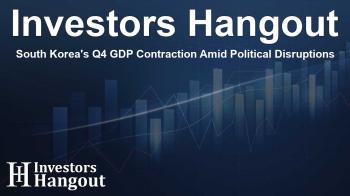South Korea's Q4 GDP Contraction Amid Political Disruptions

South Korea's Economic Performance in Q4
South Korea's economy has shown less resilience than anticipated during the fourth quarter, according to central bank estimates. This disappointing growth occurs against a backdrop of significant political turbulence that has affected economic activities across the nation.
GDP Growth Figures
The preliminary data indicates that the gross domestic product (GDP) of South Korea grew by only 0.1% on a quarter-on-quarter basis. This figure fell short of expectations that predicted a growth rate of 0.2%. Furthermore, when examined year-on-year, GDP growth dwindled to 1.2%, trailing below the expected 1.4% and the previous figure of 1.5%.
Impact of Political Unrest
The economic slowdown has been significantly influenced by political unrest in December. The scenario intensified when the previously impeached President Yun Suk Yeol attempted to impose martial law, leading to widespread uncertainty among businesses and consumers alike. This unrest has disrupted key economic activities just as many sectors were struggling.
Broader Economic Concerns
The combination of falling household spending, a potential crisis in the property market, and weakening demand for exports has compounded the challenges facing South Korea's economy. This landscape continues to generate pressure on economic growth and stability.
Future Monetary Policy Decisions
In response to the weak economic data, market analysts speculate that the Bank of Korea may consider further interest rate cuts to stimulate growth. Although the central bank initiated an easing cycle in 2024, it surprised many by maintaining rates in a recent meeting instead of lowering them as anticipated.
Conclusion
The reduced growth figures in Q4 serve as a stark reminder of how political events can ripple through the economy, affecting overall confidence and spending. A consensus is emerging among economists that immediate action may be necessary to bolster the economy in the face of these ongoing challenges.
Frequently Asked Questions
What caused the lower GDP growth in South Korea?
The lower GDP growth was primarily due to political unrest and weakened economic conditions including decreased household spending and declining export demand.
How does political turmoil affect economic performance?
Political turmoil can lead to uncertainty among consumers and businesses, causing reduced spending and investment, which ultimately impacts overall economic growth.
What actions might the Bank of Korea take in response?
The Bank of Korea may consider implementing further interest rate cuts to stimulate the economy amid these challenging conditions.
Why was the Q4 GDP growth lower than expected?
The Q4 GDP growth was lower than expected due to a combination of political upheaval and broader economic concerns such as a slowing property market and decreasing export activities.
What are the implications for households in South Korea?
The implications for households may include tighter budgets as rising uncertainty and economic challenges can lead to reduced spending power and increased financial strain.
About The Author
Contact Logan Wright privately here. Or send an email with ATTN: Logan Wright as the subject to contact@investorshangout.com.
About Investors Hangout
Investors Hangout is a leading online stock forum for financial discussion and learning, offering a wide range of free tools and resources. It draws in traders of all levels, who exchange market knowledge, investigate trading tactics, and keep an eye on industry developments in real time. Featuring financial articles, stock message boards, quotes, charts, company profiles, and live news updates. Through cooperative learning and a wealth of informational resources, it helps users from novices creating their first portfolios to experts honing their techniques. Join Investors Hangout today: https://investorshangout.com/
The content of this article is based on factual, publicly available information and does not represent legal, financial, or investment advice. Investors Hangout does not offer financial advice, and the author is not a licensed financial advisor. Consult a qualified advisor before making any financial or investment decisions based on this article. This article should not be considered advice to purchase, sell, or hold any securities or other investments. If any of the material provided here is inaccurate, please contact us for corrections.

